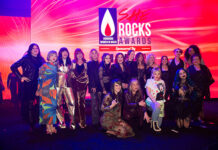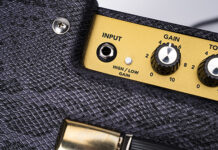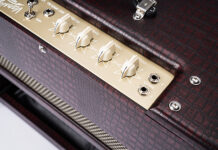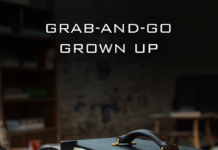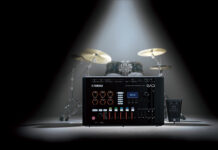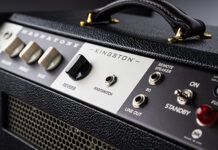Wire's Colin Newman on Upcoming Tour, Guitar Collecting
Formed in London in 1976, Wire has not only proven to be one of the most influential punk bands to come out of England (e.g. R.E.M., Blur, Sonic Youth, Savages, Elastica), but also one of punk’s longest running acts.
Beyond the 16 studio albums helmed by Wire – the newest of which is 2017’s Silver/Lead – leader Colin Newman has recorded six solo efforts and over a half-dozen EPs – with Githead, immersion, and his wife, Malka Spigel. Wire has also maintained a DIY approach to its workload outside of the studio, self-releasing many of its recordings through its own record label.
Wire – which also includes guitarist Matthew Simms, bassist/vocalist Graham Lewis and drummer Robert Grey – shows no signs of slowing down anytime soon as their U.S. tour kicks off on September 16th in Chicago. Guitar World sat down with Newman to discuss his guitar collection, his future plans and his songwriting methods.
Silver/Lead is a guitar-heavy album. Was that always the plan for you?
I’m not sure it exactly works like that. At its core Wire is a classic lineup of two guitars, bass and drums. As we all know, there are endless permutations on that but any Wire piece – bar a few exceptions – is always going to feature at least two guitar parts.
It’s in the intrinsic nature of the band. Obviously that builds up once Matt and I add a few overdubs, but there’s also been a long history of Wire having quite a lot of keyboard parts as part of at least the recoded version of the band.
How many guitars did you use to record Silver/Lead?
The simple answer would be all of them. (laughs) I mainly play my trusty Eastwood Airline and Matt mainly plays his trusty Fender Jazzmaster. There’s also quite a lot of my acoustic and I’m sure a smattering of my Baritone, 12-string and Mandola alongside Matt’s lapsteel and his Danelectro.
Do you ever write on an acoustic? What sort of demo process do you usually follow?
All through the 70’s and most of the 80’s, plus since 2010, everything I write for Wire is written on acoustic guitar. In the case of this album, tracks like “Silver/Lead,” “Brio” and “An Alibi” still retain the acoustic guitar at their center.
In fact they are the original demos, worked on and expanded by the band. These days I tend to record the original demos into Pro-Tools in my studio, but nobody hears them until it’s time to record.
Is all of your writing done on guitar?
For Wire almost all. “Sleep On The Wing” on this album is, I think, the first ever keyboard-written song on a Wire album. Outside of Wire I tend not to. It’s a very simple way of delineating between projects!
What was the first guitar you ever had?
Still got it! A Suzuki acoustic. I’ve written a huge percentage of Wire songs on it and it’s the one you hear on the albums.
How much of your guitar collection do you usually tour with?
Depends a lot on ease of transport! I have toured with my Airline, my Danelectro Baritone, my regular Danelectro, my Eastwood 12-string & my Airline Mandola! Quite a lot of guitar swapping! But recently I’ve cut it down to just my Airline.
I’ve had it retro-fitted with piezo pickups so I can mimic acoustic sounds also. Actually Eastwood are right now manufacturing a Colin Newman Signature Airline with additional piezo pickups built in from the get-go. Hopefully I’ll be able to tour with that in September.
Back to your new album, do you have a favourite song on Silver/Lead?
Yes, the title track. I really like the combination of something that is both “acoustic” and “heavy.”
Given your large discography, and 40 years of history, what’s to be expected from your upcoming live shows?
While Wire sets always feature the new album, we also try hard to include a good range of material from across our history. The most important consideration in choosing what to play live is how convincing a version we can do of older material. We are not interested in being an “efficient cover band” of our own history.
The fact that Wire’s history is actually “hit free” means we have no “Albatross” tracks we are obliged to play, and the fact that we have a highly-knowledgeable fan base means we can go deep into the catalog and come up with choices which will intrigue and surprise.
What inspired you to play three shows in New York rather than one larger show?
There’s a bit of a complicated history behind it, but ultimately it was down an offer from the club, a chance to do something special. Wire can be a really visceral experience for an audience in a small club, and the New York audience hasn’t had the chance to see Wire in a small club since we played CBGB in 1978! I think it’s going to be very special.
What’s ahead for you once this run of shows is over? Any chance of another Colin Newman solo album? More from Immersion or Githead? Another festival?
Well immediately after, in October/November will be a British tour by Wire but on the longer plan, in terms of current studio projects set for 2018 release, there will be a new Immersion album; it’s about 50% done. We are talking about a U.S. tour next year in support of that. Since our “re-booting” of Immersion last year, we have developed an effective way of playing the material live without resorting to laptops; prior to that Immersion had only played twice since 1994 when we released our debut.
I did actually re-release my first three solo albums last year on a specially-created imprint for Malka and I’s swim ~, a label called Sentient Sonics. There is a plan to re-release the Crammed albums, Commercial Suicide and It Seems, in a similar way. It’s not impossible I would make another solo album but it’s not on the current agenda.
Is there a career accomplishment you are still working towards?
Well, in parallel with the new Immersion album, I’m also working on another non-Wire related project which I can’t really talk about right now. This is me working with something already existing, not a new band. It won’t come as any kind of surprise to people who know things I am in general involved with, but perhaps the direction will surprise. Sorry to tease!
When not busy with music, how do you like to spend your free time?
Well, the thing is I run two labels, pinkflag & swim ~, three if you count Sentient Sonics, and take care of pretty much all the day to day business of Wire, so I don’t have a lot of free time. We live in Brighton and we walk by the sea every day, which is something that keeps me sane. I don’t have any hobbies.
Finally, Colin, any last words for the kids?
Well, being as this is a guitar mag, I might mention that our last guitar purchase was an electric tenor guitar. I’m not a guitar nerd and I very much see the guitar with the context of many other instruments that can be used in the making of music, but what I do like about guitars – and I include all chord-producing string instruments in this, actually – is what you get for free.
On a keyboard you have to press a key for every note you want to hear. On a guitar you can press one, two or three strings and make a chord where a lot of the strings ring “free.”
I play regular guitar in standard tuning so one of my favorite things is to come up with chord shapes that involve quite a lot of “free” notes. The tenor is tuned like a violin or mandolin/mandola, so none of the regular guitar shapes work, plus there are only four strings so it’s really easy to make nice sounding chords with only one or two fingers. I think more people should use the more exotic cousins of the guitar family, baritones, tenors, 6 string basses, mandolas, etc. Like the guy in the guitar shop in Chicago said when I tried my first baritone, “you can play the same shit you normally play and it sounds different.” Exactly. Of course I bought the guitar.
Source: www.guitarworld.com


